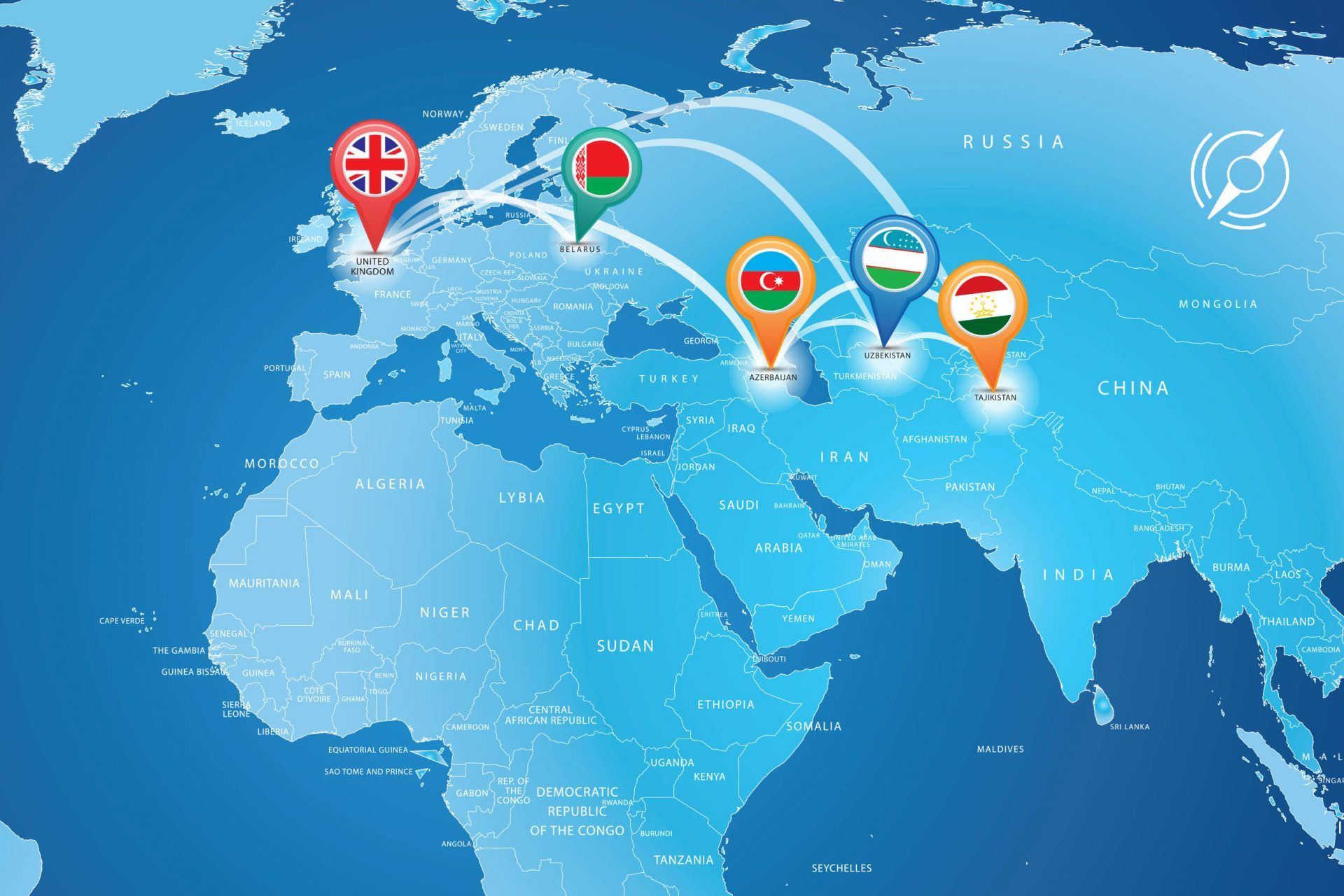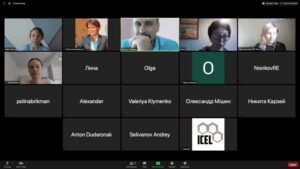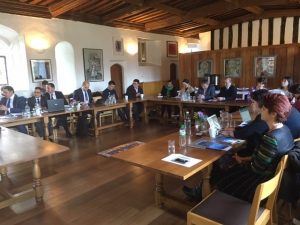Conference on the ‘History and Culture of the Great Steppe’, 26-27 August 2020
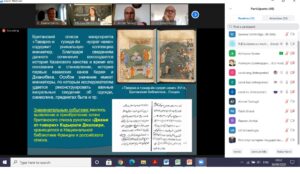 Dr Saxena was an invited speaker at the conference on the ‘History and Culture of the Great Steppe’ on 26-27 August. The conference was organised by the Republican Information Center for the Study of Historical Sources, R.B. Suleimenov Institute of Oriental Studies, Committee of Science, Ministry of Education and Science of the Republic of Kazakhstan and the interdisciplinary scientific project “History and Culture of the Great Steppe” (2018-2020). Based on three years of research, new theoretical and methodological approaches and conclusions on topical issues of history and culture, the aim was to form a holistic vision of national history, preserve historical memory, continuity and the formation of identity. Dr Saxena gave a talk on ‘ ‘Unrigid Geographies: A case of Central Asia, Eurasia and the Silk Road’ and Dr Chokan Laumulin presented on ‘Fundamental Science and Modernization of Kazakhstan’. The conference was chaired by Prof Meruert Abusseitova and moderated by a number of notable scholars from the Eurasia region. The conference began with a welcome speech by the Minister of Education and Science of the Republic of Kazakhstan, Askhat Aimagambetov.
Dr Saxena was an invited speaker at the conference on the ‘History and Culture of the Great Steppe’ on 26-27 August. The conference was organised by the Republican Information Center for the Study of Historical Sources, R.B. Suleimenov Institute of Oriental Studies, Committee of Science, Ministry of Education and Science of the Republic of Kazakhstan and the interdisciplinary scientific project “History and Culture of the Great Steppe” (2018-2020). Based on three years of research, new theoretical and methodological approaches and conclusions on topical issues of history and culture, the aim was to form a holistic vision of national history, preserve historical memory, continuity and the formation of identity. Dr Saxena gave a talk on ‘ ‘Unrigid Geographies: A case of Central Asia, Eurasia and the Silk Road’ and Dr Chokan Laumulin presented on ‘Fundamental Science and Modernization of Kazakhstan’. The conference was chaired by Prof Meruert Abusseitova and moderated by a number of notable scholars from the Eurasia region. The conference began with a welcome speech by the Minister of Education and Science of the Republic of Kazakhstan, Askhat Aimagambetov.
COVID-19 and the Resilience of Central Asia – Launch of Regional Webinars, 19 August 2020
TNU, COMPASS partner in Tajikistan, has initiated a series of regional webinars to renew the long-standing academic and cultural ties with their close neighbours in Kazakhstan, Kyrgyzstan and Uzbekistan and to rethink their common heritage in the era of independence. The launch meeting is available on YouTube.
Zoom meeting: The world of architecture. Creating the future with the best modern and historical architectural objects of Central Eurasia. 15 August 2020
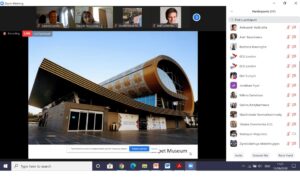 Dr Saxena chaired an online Zoom meeting titled “The world of architecture. Creating the future with the best modern and historical architectural objects of Central Eurasia” on 15 August, 2020 (11:00 AM UK). This meeting debated issues around balancing modernising aspirations of state led projects and sense of history and community of populations. Practical solutions for creating a modern city with both the historical places and the modern architectural objects were elaborated. Also during the online meeting the OCA magazine presented a brand-new project “200 landmarks of Eurasia”. It’s a special edition of OCA magazine including annual ratings that lists 200 of the most fascinating landmarks in Central Eurasia. (project) Panelists were Sheyda Novruzzade- International relations adviser of the Union of Azerbaijan Architects. President of the Young Architects and Students Club. (Azerbaijan), Vasilukha Aleksandr- Lead Architect. Atlas. (Russia), Akbarxodjaev Ziyodulloxoja- Architect of Aria Project. (Uzbekistan), Magrubov Khumoyun- Marketing Communications Manager in Houz of Architects. (Uzbekistan).
Dr Saxena chaired an online Zoom meeting titled “The world of architecture. Creating the future with the best modern and historical architectural objects of Central Eurasia” on 15 August, 2020 (11:00 AM UK). This meeting debated issues around balancing modernising aspirations of state led projects and sense of history and community of populations. Practical solutions for creating a modern city with both the historical places and the modern architectural objects were elaborated. Also during the online meeting the OCA magazine presented a brand-new project “200 landmarks of Eurasia”. It’s a special edition of OCA magazine including annual ratings that lists 200 of the most fascinating landmarks in Central Eurasia. (project) Panelists were Sheyda Novruzzade- International relations adviser of the Union of Azerbaijan Architects. President of the Young Architects and Students Club. (Azerbaijan), Vasilukha Aleksandr- Lead Architect. Atlas. (Russia), Akbarxodjaev Ziyodulloxoja- Architect of Aria Project. (Uzbekistan), Magrubov Khumoyun- Marketing Communications Manager in Houz of Architects. (Uzbekistan).
Dr Anar Valiyev appointed Jean Monnet Chair
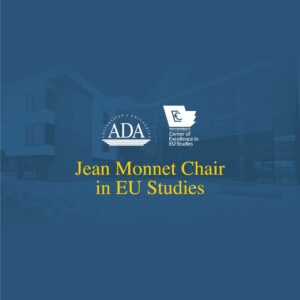
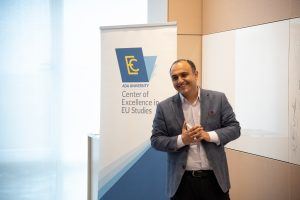 GCRF COMPASS and Center of Excellence in EU Studies are pleased to announce that Dr. Anar Valiyev, Dean and Associate Professor of ADA University School of Public and International Affairs has been appointed Jean Monnet Chair in EU Studies by European Union Jean Monnet Action from September 2020. As part of the Jean Monnet program, a Jean Monnet Chair is a teaching post granted to university lecturers who specialize in European Union studies and research. Dr. Valiyev is the second person in Azerbaijan and the first academician at ADA University to be awarded with this position. Dr. Anar Valiyev will help cultivate researchers and strengthen EU studies during his 3-year tenure.
GCRF COMPASS and Center of Excellence in EU Studies are pleased to announce that Dr. Anar Valiyev, Dean and Associate Professor of ADA University School of Public and International Affairs has been appointed Jean Monnet Chair in EU Studies by European Union Jean Monnet Action from September 2020. As part of the Jean Monnet program, a Jean Monnet Chair is a teaching post granted to university lecturers who specialize in European Union studies and research. Dr. Valiyev is the second person in Azerbaijan and the first academician at ADA University to be awarded with this position. Dr. Anar Valiyev will help cultivate researchers and strengthen EU studies during his 3-year tenure.
ECPR online course on Social Network Analysis 3 – 7 August 2020
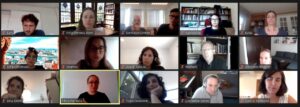 On 3-7 August 2020 Dr Irina Petrova attended the online course on Social Network Analysis, organised in the framework of the European Consortium for Political Research (ECPR) 1st Virtual Methods School. The intensive course was taught by Dr Silvia Fierăscu (Universitatea de Vest din Timisoara, Romania) and attended by forty international researchers. The course provided an in-depth training in the network theory, research design and analysis with R, as well as showcased various examples of the network theory application to political research. Dr Irina Petrova will use the Social Network Analysis method in her research on resilience and local ownership in international cooperation in Eurasia.
On 3-7 August 2020 Dr Irina Petrova attended the online course on Social Network Analysis, organised in the framework of the European Consortium for Political Research (ECPR) 1st Virtual Methods School. The intensive course was taught by Dr Silvia Fierăscu (Universitatea de Vest din Timisoara, Romania) and attended by forty international researchers. The course provided an in-depth training in the network theory, research design and analysis with R, as well as showcased various examples of the network theory application to political research. Dr Irina Petrova will use the Social Network Analysis method in her research on resilience and local ownership in international cooperation in Eurasia.
Panel Discussion on ‘Development Damlyama: Reflecting on Development Aid Cooperation Paradigms in Central Asia’, 30 July 2020
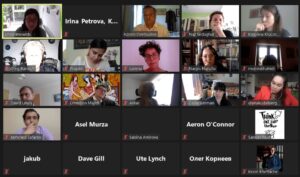 On 30 July 2020, UKRI GCRF COMPASS, Centre of Development Studies (University of Cambridge) and Cambridge Central Asia Forum (Jesus College, University of Cambridge) held a panel discussion on ‘Development Damlyama: Reflecting on Development Aid Cooperation Paradigms in Central Asia’. The expert panel was made up of practitioners and academics namely S. Mowlds (Cambridge Central Asia Forum), Dr K. Kluczewska (Justus-Liebig University Giessen), Dr U. Majidi (University of Sussex) and Dr L. Lombardozzi (the Open University), with Prajakti Kalra and Dr Diana Kudaibergenova as discussants and Dr Siddharth (Montu) Saxena as Chair. The presentations and discussion centered around the mismatch between International Organisations, aid agencies and donor countries and the region of Central Asia and wider Eurasia. The speakers focused on the need for categorising the region of Eurasia and more specifically Central Asia in a way that would best reflect the realities on the ground. The historical and economic perspectives which underlie the region’s needs and specificity along with the finding ways to navigate between stakeholders and their own needs and requirements was brought to fore in the Q&A session. The event attracted more than 50 participants from across Central Asia, the UK and more globally. Further information can be found here.
On 30 July 2020, UKRI GCRF COMPASS, Centre of Development Studies (University of Cambridge) and Cambridge Central Asia Forum (Jesus College, University of Cambridge) held a panel discussion on ‘Development Damlyama: Reflecting on Development Aid Cooperation Paradigms in Central Asia’. The expert panel was made up of practitioners and academics namely S. Mowlds (Cambridge Central Asia Forum), Dr K. Kluczewska (Justus-Liebig University Giessen), Dr U. Majidi (University of Sussex) and Dr L. Lombardozzi (the Open University), with Prajakti Kalra and Dr Diana Kudaibergenova as discussants and Dr Siddharth (Montu) Saxena as Chair. The presentations and discussion centered around the mismatch between International Organisations, aid agencies and donor countries and the region of Central Asia and wider Eurasia. The speakers focused on the need for categorising the region of Eurasia and more specifically Central Asia in a way that would best reflect the realities on the ground. The historical and economic perspectives which underlie the region’s needs and specificity along with the finding ways to navigate between stakeholders and their own needs and requirements was brought to fore in the Q&A session. The event attracted more than 50 participants from across Central Asia, the UK and more globally. Further information can be found here.
CV19 Workshop, 30 July 2020
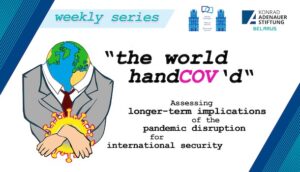 On 30 July 2020 Professor Korosteleva participated in the CV19 workshop organised co-jointly by the Minsk Dialogue Council on International Relations (Belarus), Konrad-Adenauer-Stiftung (KAS Belarus, Germany) and GCRF COMPASS (UK).
On 30 July 2020 Professor Korosteleva participated in the CV19 workshop organised co-jointly by the Minsk Dialogue Council on International Relations (Belarus), Konrad-Adenauer-Stiftung (KAS Belarus, Germany) and GCRF COMPASS (UK).
This online discussion has focused on the United Kingdom, and the three particular questions:
– What specific security and geopolitical circumstances does the UK find itself in after Brexit and at the time of the pandemic disruption?
– What major security policy dilemmas is the UK facing now and is likely to face as the Covid-19 crisis is over?
– How will Brexit and the pandemic and its longer-term effects impact the UK’s status and role in the international system?
– What strategic implications will the (non)changing UK’s role in the world have for Euro-Atlantic and Eurasian security?
Other participants were:
- Mr. Tinko Weibezahl, Department of European and International Cooperation, Konrad-Adenauer-Stiftung, Germany
- Ms. Alexandra Murphy, Visiting Fellow, Minsk Dialogue Council on International Relations, UK-Belarus
- Mr. Jakob Wöllenstein, Director Country Office Belarus, Konrad-Adenauer-Stiftung, Germany
- Mr. Yauheni Preiherman, Director, Minsk Dialogue Council on International Relations, Belarus
More information could be found live-streamed on the Minsk Dialogue’s Facebook page; and policy briefs on the COMPASS Crisis Reflections page.
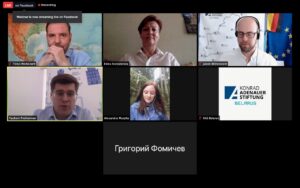
GCRF Cluster project AGRE meeting, 28 July 2020
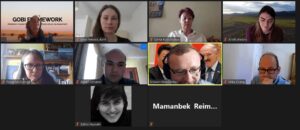 On 28 July 2020 COMPASS team members Prof. Elena Korosteleva, Dr. Irina Petrova, Dr. Artsiom Nazaranka and Dr. Akram Umarov joined the meeting of the GCRF Cluster project AGRE ‘Fostering Adaptive Governance and Resilience in Local Communities of Central Eurasia: from fragmented pasts to connected futures?’. AGRE is a cluster of three GCRF-funded projects including COMPASS, along with Laajverd Project (Prof. Michael Crang and Dr Zahra Hussain, Durham University) and Gobi Framework: Mediation model for sustainable infrastructure development (Prof. Fiona McConnell, Prof. Ariell Ahearn and Prof. Troy Stenberg, University of Oxford).
On 28 July 2020 COMPASS team members Prof. Elena Korosteleva, Dr. Irina Petrova, Dr. Artsiom Nazaranka and Dr. Akram Umarov joined the meeting of the GCRF Cluster project AGRE ‘Fostering Adaptive Governance and Resilience in Local Communities of Central Eurasia: from fragmented pasts to connected futures?’. AGRE is a cluster of three GCRF-funded projects including COMPASS, along with Laajverd Project (Prof. Michael Crang and Dr Zahra Hussain, Durham University) and Gobi Framework: Mediation model for sustainable infrastructure development (Prof. Fiona McConnell, Prof. Ariell Ahearn and Prof. Troy Stenberg, University of Oxford).
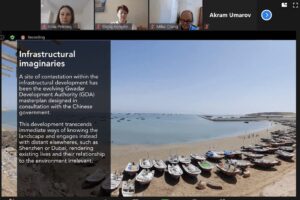 The meeting was devoted to an in-depth discussion of the three participating projects, knowledge and experience exchange and preparation of the detailed action plan for the project implementation. The teams shared best practices, risks and potential risk mitigation strategies. The meeting also addressed methodological adaptations of the project in view of the COVID-19 pandemic. Further information about the AGRE project can be found here.
The meeting was devoted to an in-depth discussion of the three participating projects, knowledge and experience exchange and preparation of the detailed action plan for the project implementation. The teams shared best practices, risks and potential risk mitigation strategies. The meeting also addressed methodological adaptations of the project in view of the COVID-19 pandemic. Further information about the AGRE project can be found here.
Policy Impact: EU External Action Chief thanked Prof. Korosteleva & Dr Buscaneanu for their research
Prof. Korosteleva and Dr Buscaneanu (King’s College London, COMPASS affiliate) research into the Eastern Partnership’s ‘more for more’ principle for the eastern neighbourhood, summarised in their research paper ’The EU and the Eastern Partnership Countries – how to “lose weight’ and incentivise reforms?’ has generated substantial policy impact and received a high-level accolade from the High Representative for EU Foreign Affairs & Security Policy Josep B. Fontelles, delivered by R. Darski, Acting Head of Division for EaP, Regional Cooperation & OSCE, European External Action Service:
“On behalf of the High Representative of the European Union for Foreign Affairs and Security Policy Josep Borrell Fontelles, I would like to thank you for sharing your Research Brief on the Eastern Partnership and the “more for more” principle…Your analysis concerning the “more for more” principle is of significant interest to us and we take very good note of your suggestions. We are looking forward to further discussing these with you at the next possible occasion.” The letter was received on 16 June 2020. More information is available here.
Policy Impact: Prof. Korosteleva & Dr Petrova launched the CRISIS REFLECTION page to capture the impact of the CV19
The COMPASS Crisis Reflections page – https://research.kent.ac.uk/gcrf-compass/outputs/crisis-reflections/ has become a hot spot for sharing thoughts and reflections on the impact of CV19 around the world and the wider Eurasian region in particular. Thus far, it has received over 50 submissions, including from the members of the COMPASS Advisory Board, and many COMPASS project affiliates.
Podcast: Interview with Dr Diana T. Kudaibergenova, 24 July 2020
Podcast: Interview with Dr Diana T. Kudaibergenova on her new book ‘Toward Nationalizing Regimes Conceptualizing Power and Identity in the Post-Soviet Realm’. She was interviewed by Steven Seegel is Professor of History at the University of Northern Colorado, https://newbooksnetwork.com/diana-t-kudaibergenova-toward-nationalizing-regimes-conceptualizing-power-and-identity-in-the-post-soviet-realm-u-pittsburgh-press-2020/
COMPASS Work-in-progress seminar ‘Hamsoya – united in shadows: the making of resilient communities in Wider Eurasia’, 16 July 2020
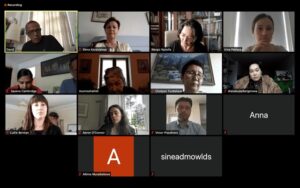 On 16 July 2020 COMPASS held a Work-in-progress seminar ‘Hamsoya – united in shadows: the making of resilient communities in Wider Eurasia’. The session focused on two draft papers. Professor David Chandler (University of Westminster) presented his paper ‘Becoming Resilient: The ‘Right to Opacity’ as the Foundation of ‘Relations of Community’ and Professor Nargis Nurulla-Khodzhaeva (Moscow State University) discussed the ideas of resilience stemming from Sufism in her paper ‘Bouncing Back: the Value of Glocal Resilience and Sufi-Hamsoya’. The discussion highlighted the importance of conceptual thinking beyond modernity and Western-centric perspectives of resilience.
On 16 July 2020 COMPASS held a Work-in-progress seminar ‘Hamsoya – united in shadows: the making of resilient communities in Wider Eurasia’. The session focused on two draft papers. Professor David Chandler (University of Westminster) presented his paper ‘Becoming Resilient: The ‘Right to Opacity’ as the Foundation of ‘Relations of Community’ and Professor Nargis Nurulla-Khodzhaeva (Moscow State University) discussed the ideas of resilience stemming from Sufism in her paper ‘Bouncing Back: the Value of Glocal Resilience and Sufi-Hamsoya’. The discussion highlighted the importance of conceptual thinking beyond modernity and Western-centric perspectives of resilience.
Educational challenges and opportunities of the Coronavirus in Central Asia, 14 July 2020
 Dr Saxena was invited to be a panelist by the Open Central Asia Magazine at a meeting titled “Educational challenges and opportunities of the Coronavirus in Central Asia” on July 14, 2020. With panelists joining in, not only Central Asia, but also Caucasus, key ideas of how to conduct education and research under the threat of pandemic. An important outcome was understanding of challenges faced by technical and medical education where laboratory bench work was essential. Other panelists were Ulker Sattarova, Vice Rector of Strategy Development, Azerbaijan University of Architecture and Construction, Professor of Computer Science, Professor Dr. Maurits Van Rooijen Chief Executive (Academic), Group Rector, Global University Systems, Professor Dr. Gordana Pesakovic, Webster University in Tashkent, Economics professor at WUT bachelor’s and MBA classes, and Professor Dr. Vinodhini Rheardon, Webster University in Tashkent, professor in the MA Teaching English as a Second Language program.
Dr Saxena was invited to be a panelist by the Open Central Asia Magazine at a meeting titled “Educational challenges and opportunities of the Coronavirus in Central Asia” on July 14, 2020. With panelists joining in, not only Central Asia, but also Caucasus, key ideas of how to conduct education and research under the threat of pandemic. An important outcome was understanding of challenges faced by technical and medical education where laboratory bench work was essential. Other panelists were Ulker Sattarova, Vice Rector of Strategy Development, Azerbaijan University of Architecture and Construction, Professor of Computer Science, Professor Dr. Maurits Van Rooijen Chief Executive (Academic), Group Rector, Global University Systems, Professor Dr. Gordana Pesakovic, Webster University in Tashkent, Economics professor at WUT bachelor’s and MBA classes, and Professor Dr. Vinodhini Rheardon, Webster University in Tashkent, professor in the MA Teaching English as a Second Language program.Announcement of forthcoming Monograph
The COMPASS project is delighted to announce its forthcoming monograph ‘Resilience in EU and International Institutions’ to be released by Routledge in December, 2020. The monograph is based on the Special Issue published in the journal of Contemporary Security Policy, some exciting new chapters and updates from the editors – Profs. Korosteleva and Flockhart. Please see here for further information.
Jean Monnet NORTIA Network Paper Feedback Session, 7 July 2020
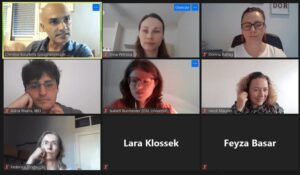 On 7 July 2020 COMPASS PDRA Dr Irina Petrova participated in one of the final events of the Jean Monnet NORTIA Network, dedicated to feedback on the work-in-progress. Dr Petrova presented her research on the conceptualisation of the principle of local ownership in international affairs. The paper focused on the analysis of the theoretical approaches to ‘the local’ and local ownership in the scholarship on international development, state- and peace-building and Global International Relations. The session included professors and early-career researchers from the University of Kent, European University Institute, ARENA Centre for European Studies, University of Oslo, KU Leuven, Leiden University, Institut Barcelona d’Estudis Internacionals (IBEI), Maastricht University, University College Dublin, Adam Mickiewicz University in Poznan and University Association for Contemporary European Studies (UACES).
On 7 July 2020 COMPASS PDRA Dr Irina Petrova participated in one of the final events of the Jean Monnet NORTIA Network, dedicated to feedback on the work-in-progress. Dr Petrova presented her research on the conceptualisation of the principle of local ownership in international affairs. The paper focused on the analysis of the theoretical approaches to ‘the local’ and local ownership in the scholarship on international development, state- and peace-building and Global International Relations. The session included professors and early-career researchers from the University of Kent, European University Institute, ARENA Centre for European Studies, University of Oslo, KU Leuven, Leiden University, Institut Barcelona d’Estudis Internacionals (IBEI), Maastricht University, University College Dublin, Adam Mickiewicz University in Poznan and University Association for Contemporary European Studies (UACES).
Conference on the Future of Europe, 1 July 2020
 Dr Albena Azmanova, a COMPASS affiliate (Brussels) speaks at a citizens-centred Conference on the Future of Europe, to mark the beginning of the German EU Presidency. Dr Azmanova will caution against turning democracy into a neoliberal fantasy, arguing that political elites must not be allowed to dump their
Dr Albena Azmanova, a COMPASS affiliate (Brussels) speaks at a citizens-centred Conference on the Future of Europe, to mark the beginning of the German EU Presidency. Dr Azmanova will caution against turning democracy into a neoliberal fantasy, arguing that political elites must not be allowed to dump their 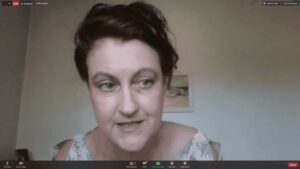 responsibility onto the people, allegedly in the name of democracy. The conference has gathered over 70 participants. Other speakers include Prof. Kalypso Nicolaidis (Oxford); Prof. Claudio Radaelli (UCL European Institute); Maarten De Groot (ECI Initiative); Guillaume Klossa (CIVICO Europe) and many more. For information visit the conference programme.
responsibility onto the people, allegedly in the name of democracy. The conference has gathered over 70 participants. Other speakers include Prof. Kalypso Nicolaidis (Oxford); Prof. Claudio Radaelli (UCL European Institute); Maarten De Groot (ECI Initiative); Guillaume Klossa (CIVICO Europe) and many more. For information visit the conference programme.
‘London Calling! Representing the Heart of Eurasia in the Global City of London’, 1 July 2020
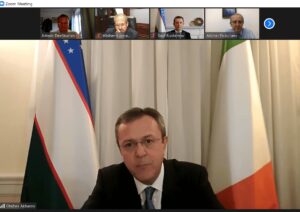 GCRF COMPASS Cambridge organised a panel discussion on ‘London Calling! Representing the Heart of Eurasia in London’ with the current Ambassador and former Ambassadors of the Republic of Uzbekistan in the United Kingdom to discuss their epoch of representing different stages of development, priorities and signs of times. The panellists were His Excellency Faizullaev (1999-2003); His Excellency Akbarov (2007-2015; and now serving as Ambassador to Italy); His Excellency Kurmanov (2015-2017, currently Ambassador to Ukraine); His Excellency Rustamov (2019-Current). The discussion was moderated by Dr Saxena. The event was co-organised with the Cambridge Central Asia Forum, Jesus College, Uni of Cambridge and attracted over a 100 people including the Committee of the Cambridge Central Asia Forum, namely Sir B. Ponder, Prof Nolan. Emeritus Fellow N. Ray, Emeritus Prof Skaer and many other senior scholars from the Uni of Cambridge. GCRF COMPASS PI Prof Korosteleva (Uni of Kent), NTL Mr. Nazaranka (BSU), Dr Umarov (UWED), COMPASS PDRAs Dr Kudaibergenova, Dr van Gils, Dr Madiev and Dr Petrova also attended the panel discussion.
GCRF COMPASS Cambridge organised a panel discussion on ‘London Calling! Representing the Heart of Eurasia in London’ with the current Ambassador and former Ambassadors of the Republic of Uzbekistan in the United Kingdom to discuss their epoch of representing different stages of development, priorities and signs of times. The panellists were His Excellency Faizullaev (1999-2003); His Excellency Akbarov (2007-2015; and now serving as Ambassador to Italy); His Excellency Kurmanov (2015-2017, currently Ambassador to Ukraine); His Excellency Rustamov (2019-Current). The discussion was moderated by Dr Saxena. The event was co-organised with the Cambridge Central Asia Forum, Jesus College, Uni of Cambridge and attracted over a 100 people including the Committee of the Cambridge Central Asia Forum, namely Sir B. Ponder, Prof Nolan. Emeritus Fellow N. Ray, Emeritus Prof Skaer and many other senior scholars from the Uni of Cambridge. GCRF COMPASS PI Prof Korosteleva (Uni of Kent), NTL Mr. Nazaranka (BSU), Dr Umarov (UWED), COMPASS PDRAs Dr Kudaibergenova, Dr van Gils, Dr Madiev and Dr Petrova also attended the panel discussion.
EUCROSS Webinar ‘World Politics after the COVID-19 Outbreak: Reflections on EU-Russia Relations’, 30 June 2020
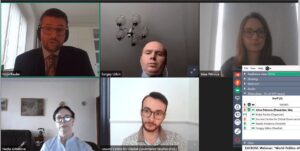 .On 30 June 2020 COMPASS PDRA Dr Irina Petrova contributed to the webinar ‘World Politics after the COVID-19 Outbreak: Reflections on EU-Russia Relations’, organised by KU Leuven (Belgium) in the framework of the Jean Monnet EUCROSS Network. The panel also included Dr. Nadia Arbatova, Head of the Department on European Political Studies, Institute for World Economy and International Relations, Moscow (IMEMO), Dr. Sergey Utkin, Head of the Strategic Assessment Section, Institute for World Economy and International Relations, Moscow (IMEMO) and Prof. Dr. Kolja Raube, Assistant professor for European Studies (KU Leuven). The panel focused on the impacts of the pandemic on the international world order and, in particular, four actors – the US, the EU, Russia and China. The discussion touched upon the multiple challenges for the EU-Russia cooperation and potential solutions, such as technical, scientific and medical cooperation, people-to-people contacts, parliamentary diplomacy, institutional cooperation in the framework of the OSCE, greater diplomatic engagement etc. More information about the EUCROSS Network can be found here.
.On 30 June 2020 COMPASS PDRA Dr Irina Petrova contributed to the webinar ‘World Politics after the COVID-19 Outbreak: Reflections on EU-Russia Relations’, organised by KU Leuven (Belgium) in the framework of the Jean Monnet EUCROSS Network. The panel also included Dr. Nadia Arbatova, Head of the Department on European Political Studies, Institute for World Economy and International Relations, Moscow (IMEMO), Dr. Sergey Utkin, Head of the Strategic Assessment Section, Institute for World Economy and International Relations, Moscow (IMEMO) and Prof. Dr. Kolja Raube, Assistant professor for European Studies (KU Leuven). The panel focused on the impacts of the pandemic on the international world order and, in particular, four actors – the US, the EU, Russia and China. The discussion touched upon the multiple challenges for the EU-Russia cooperation and potential solutions, such as technical, scientific and medical cooperation, people-to-people contacts, parliamentary diplomacy, institutional cooperation in the framework of the OSCE, greater diplomatic engagement etc. More information about the EUCROSS Network can be found here.
Jean Monnet NORTIA Network professionalisation session, 23 June 2020
On 23 June 2020 Dr Irina Petrova contributed to the Jean Monnet NORTIA Network  professionalisation session “How to organise your PhD and think about publishing”. Organised by Dr Heidi Maurer (University of Bristol), the panel also featured Professor Richard Whitman (University of Kent), Dr Ana Juncos (University of Bristol) and Dr Daniel Schade (University of Magdeburg). The discussion focused on advising doctoral students how to develop their publication strategy, select a journal and overcome the challenges of the publication process. The session attracted more than 50 early-career researchers and was supported by the academic association for Contemporary European Studies (UACES).
professionalisation session “How to organise your PhD and think about publishing”. Organised by Dr Heidi Maurer (University of Bristol), the panel also featured Professor Richard Whitman (University of Kent), Dr Ana Juncos (University of Bristol) and Dr Daniel Schade (University of Magdeburg). The discussion focused on advising doctoral students how to develop their publication strategy, select a journal and overcome the challenges of the publication process. The session attracted more than 50 early-career researchers and was supported by the academic association for Contemporary European Studies (UACES).
GCRF Cluster Project online launch meeting, 22 June 2020
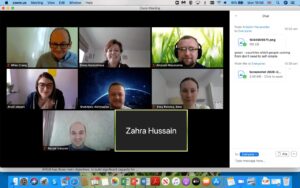 On 22 June 2020 Professor Elena Korosteleva and Dr Irina Petrova took part in the online launch of the GCRF Cluster project AGRE ‘Fostering Adaptive Governance and Resilience in Local Communities of Central Eurasia: from fragmented pasts to connected futures?’. AGRE brings together three GCRF projects – COMPASS (Professor Korosteleva and Dr Irina Petrova, University of Kent), Resilient Silk Route Heritage Network (Professor Michael Crang and Dr Zahra Hussain, Durham University) and ESRC-GCRF Gobi Framework project (Dr Ariell Ahearn and Dr Troy Stenberg, University of Oxford), as well as Belarusian State University (Dr Artsiom Nazaranka) and Innovation & Scientific Research Centre Tashkent (Dr Akram Umarov and Mr Shakhboz Akhmedov). AGRE project aims at synergising the findings of the three GCRF projects and developing a Phase 2 application as a follow-up of the AGRE Cluster project. The online launch was devoted to the discussion of the ongoing research, planning project activities and COVID-19 mitigation strategies.
On 22 June 2020 Professor Elena Korosteleva and Dr Irina Petrova took part in the online launch of the GCRF Cluster project AGRE ‘Fostering Adaptive Governance and Resilience in Local Communities of Central Eurasia: from fragmented pasts to connected futures?’. AGRE brings together three GCRF projects – COMPASS (Professor Korosteleva and Dr Irina Petrova, University of Kent), Resilient Silk Route Heritage Network (Professor Michael Crang and Dr Zahra Hussain, Durham University) and ESRC-GCRF Gobi Framework project (Dr Ariell Ahearn and Dr Troy Stenberg, University of Oxford), as well as Belarusian State University (Dr Artsiom Nazaranka) and Innovation & Scientific Research Centre Tashkent (Dr Akram Umarov and Mr Shakhboz Akhmedov). AGRE project aims at synergising the findings of the three GCRF projects and developing a Phase 2 application as a follow-up of the AGRE Cluster project. The online launch was devoted to the discussion of the ongoing research, planning project activities and COVID-19 mitigation strategies.
High level think-tank on the future of the Eastern Partnership Initiative, 19 June 2020
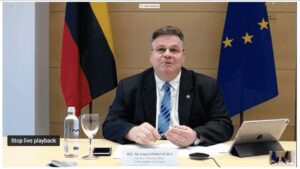 On 19 June 2020 Prof. Elena Korosteleva and Dr Irina Petrova were invited to participate in a closed high-level think-tank event on the future of the Eastern Partnership Initiative, following the summit of the Heads of States and governments the day before. The event included Linas Linkevičius, Minister of Foreign Affairs of Lithuania; Emine Dzhaparova, First Deputy Foreign Minister of Ukraine; Andrius Kubilius, Chair Euronest, Former Prime Minister of Lithuania; Angelina Eichhorst, Managing
On 19 June 2020 Prof. Elena Korosteleva and Dr Irina Petrova were invited to participate in a closed high-level think-tank event on the future of the Eastern Partnership Initiative, following the summit of the Heads of States and governments the day before. The event included Linas Linkevičius, Minister of Foreign Affairs of Lithuania; Emine Dzhaparova, First Deputy Foreign Minister of Ukraine; Andrius Kubilius, Chair Euronest, Former Prime Minister of Lithuania; Angelina Eichhorst, Managing 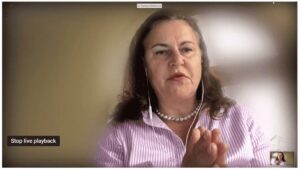 Director Europe and Central Asia, EEAS; Katariná Mathernová, Deputy Director General, European Commission, DG NEAR; Nicu Popescu, Director of the Wider Europe Programme of the European Council on Foreign Relations, former Moldovan Minister of Foreign Affairs; and Richard Giragosian, Founding Director of the Regional Studies Center, Armenia. Cristina Gherasimov, Research Fellow at the Robert Bosch Center for Central Eastern Europe, Russia and Central Asia at DGAP, acted as a moderator of the discussion.
Director Europe and Central Asia, EEAS; Katariná Mathernová, Deputy Director General, European Commission, DG NEAR; Nicu Popescu, Director of the Wider Europe Programme of the European Council on Foreign Relations, former Moldovan Minister of Foreign Affairs; and Richard Giragosian, Founding Director of the Regional Studies Center, Armenia. Cristina Gherasimov, Research Fellow at the Robert Bosch Center for Central Eastern Europe, Russia and Central Asia at DGAP, acted as a moderator of the discussion.
The Second COMPASS Special Issue Workshop ‘Hamsoya – united in shadows: the making of resilient communities in Wider Eurasia’, 18 June 2020
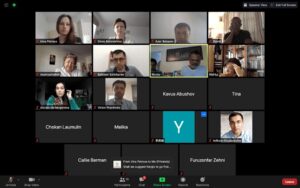 The 2nd COMPASS SI workshop took place on 18 June 2020, bringing together over 30 participants across the three continents. The workshop focused on unpacking the key concepts of the Special Issue – resilience, identity, ‘good life’, ‘hamsoya – being together in shadow’, and peoplehood – and applying them to the case-studies of Azerbaijan, Belarus, Tajikistan and Uzbekistan. The workshop also involved external discussants as top-level experts – Professors David Chandler (Westminster University); Andrea Gawrich (JLU Giessen);
The 2nd COMPASS SI workshop took place on 18 June 2020, bringing together over 30 participants across the three continents. The workshop focused on unpacking the key concepts of the Special Issue – resilience, identity, ‘good life’, ‘hamsoya – being together in shadow’, and peoplehood – and applying them to the case-studies of Azerbaijan, Belarus, Tajikistan and Uzbekistan. The workshop also involved external discussants as top-level experts – Professors David Chandler (Westminster University); Andrea Gawrich (JLU Giessen); 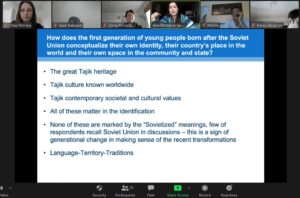 Magnus Marsden (University of Sussex); Fabienne Bossuyt (Ghent University) and Grigory Ioffe (Radford University) – to provide further feedback on individual papers. The workshop was attended by many PhD and Postdocs, with a specialist interest in the region. More information can be found here.
Magnus Marsden (University of Sussex); Fabienne Bossuyt (Ghent University) and Grigory Ioffe (Radford University) – to provide further feedback on individual papers. The workshop was attended by many PhD and Postdocs, with a specialist interest in the region. More information can be found here.
Publication of new book, June 2020
Congratulations to Dr Kudaibergenova on the publication of her book Towards Nationalizing Regimes: Conceptualizing Power and Identity in the Post-Soviet Realm (Pittsburgh University Press, 2020)! The book offers a powerful analysis of nation-building processes after the collapse of the Soviet Union, comparing the trajectories of Latvia and Kazakhstan.
’The EU and the Eastern Partnership Countries – how to “lose weight’ and incentivise reforms?’ – Policy Impact, 16 June 2020
Dr Buscaneanu and Prof. Korosteleva’s research into the Eastern Partnership’s ‘more for more’ principle for the eastern neighbourhood, summarised in their research paper ’The EU and the Eastern Partnership Countries – how to “lose weight’ and incentivise reforms?’ has generated substantial policy impact as expressed by Radoslaw Darski, Acting Head of Division for EaP, Regional Cooperation & OSCE, European External Action Service:
“On behalf of the High Representative of the European Union for Foreign Affairs and Security Policy Josep Borrell Fontelles, I would like to thank you for sharing your Research Brief on the Eastern Partnership and the “more for more” principle…Your analysis concerning the “more for more” principle is of significant interest to us and we take very good note of your suggestions. We are looking forward to further discussing these with you at the next possible occasion.” received 16 June 2020.
‘BRI for Eastern Europe, before and after the COVID-19 pandemic: challenges and perspectives’, 16 June 2020
On 16 June 2020 Prof. Roza Turarbekova, Director of the Centre for Eurasian and European Studies, Faculty of International Relations, BSU, in cooperation with Friedrich Ebert Stiftung, organised a workshop ‘BRI for Eastern Europe, before and after the COVID-19 pandemic: challenges and perspectives’. The workshop involved a series of insightful discussions about emerging partnerships between Ukraine; Belarus and China, and their benefits and challenges when moving to the BRI 2.0 phase, in the post-pandemic context. The workshop involved many young and talented speakers from the region, including representatives from the Belarusian State University (Dr Olesia Rubo & Prof. Turarbekova), Belarusian Institute of Strategic Research (Dr Anton Dudarenok), Minsk Dialogue Council (Ms Olga Kulai) – from Belarus; and the Diplomatic Academy MFA (Dmitry Efremov), and Kiev National University (Dr Lina Polischuk). The programme is available here, and more discussion is to follow.
31st Council of the European Greens, 10-13 June 2020
 Professor Azmanova, COMPASS project affiliate and senior female staff at the Brussels School of International studies, has been invited to speak at the 31st Council of the European Greens the highest decision-making body of the party, on 10-13 June 2020 (online), to reflect on the precarity of capitalism, and importance of having a strong European Social Union in times of the Corona crisis, in the situation of growing of social insecurity and the crisis of modern capitalism, as starting point of the discussion. Then the discussion will be opened to the other panellists, which are: Luca Visentini (Secretary General of the European Trade Union Confederation), Ernest Urtasun (Green MEP), Terry Reintke (Green MEP) and Rutger Groot Wassink (Deputy Mayor of Amsterdam).
Professor Azmanova, COMPASS project affiliate and senior female staff at the Brussels School of International studies, has been invited to speak at the 31st Council of the European Greens the highest decision-making body of the party, on 10-13 June 2020 (online), to reflect on the precarity of capitalism, and importance of having a strong European Social Union in times of the Corona crisis, in the situation of growing of social insecurity and the crisis of modern capitalism, as starting point of the discussion. Then the discussion will be opened to the other panellists, which are: Luca Visentini (Secretary General of the European Trade Union Confederation), Ernest Urtasun (Green MEP), Terry Reintke (Green MEP) and Rutger Groot Wassink (Deputy Mayor of Amsterdam).
New book by A. Azmanova: Capitalism on Edge. How Fighting Precarity Can Achieve Radical Change Without Crisis or Utopia (Columbia University Press, 2020)
International Conference on the occasion of the 2nd anniversary of the establishment of the
Academy of the General Prosecutor’s Office of the Republic of Uzbekistan, 27 May 2020
Dr Saxena was a plenary speaker at the International Conference on the occasion of the 2nd anniversary of the establishment of the
Academy of the General Prosecutor’s Office of the Republic of Uzbekistan. Meeting was titled “Improving the Educational Potential in the Field of Law Enforcement: Modern Challenges and Solutions” and was held in Tashkent, May 27, 2020 ( via Zoom). Academy has developed a strong partnership with the GCRF-COMPASS team in University of Cambridge to develop cooperation in the areas of multidisciplinary interdisciplinary research methodology approaches. The meeting was chaired Mr Evgeniy Kolenko, Rector of the Academy and Deputy Prosecutor General of Uzbekistan Mr Erkin Yuldashev and it brought together academic partners from Europe, Asia and Eurasia, International Institutions and heads of similar academics from all of the Central Asian countries and Russia, Ukraine, Belarus and Azerbaijan.
GCRF Cluster Project pre-launch meeting, 11 May 2020
On 11 May 2020 COMPASS had a project pre-launch meeting for the new GCRF Cluster project AGRE ‘Fostering Adaptive Governance and Resilience in Local Communities of Central Eurasia: from fragmented pasts to connected futures?’. The project is led by Durham University (Professor Michael Crang) in partnership with Kent University (Professor Korosteleva and Dr Irina Petrova) and Oxford University (Dr Ariell Ahearn and Dr Troy Stenberg) in the UK, and currently three partners in the region – Laajverd Project (Dr Zahra Hussain), Belarusian State University (Dr Artsiom Nazaranka) and Innovation & Scientific Research Centre Tashkent (Dr Shakhboz Akhmedov and Dr Akram Umarov). The project aims to connect the partners across the wider region to work co-jointly towards 1) conceptualising and unpacking fragilities and communities’ resilient response; and 2) setting up a wider framework for a new Cluster bid application in 2021. The project is to start on 1 June 2020.
Guest lecture by A. Morrison ‘An earthquake which took Turkestan from the seventeenth to the twentieth century”: Reassessing the 1916 Central Asian Revolt’, 8 May 2020, Cambridge
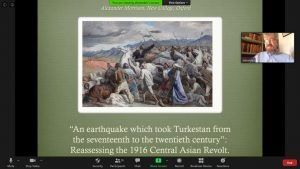 Cambridge Central Asia Forum in collaboration with GCRF COMPASS and Centre of Development Studies, University of Cambridge hosted a talk by Dr A. Morisson, New College, University of Oxford on ‘An earthquake which took Turkestan from the seventeenth to the twentieth century”: Reassessing the 1916 Central Asian Revolt’ on 8 May 2020. The talk related to the 1916 Revolt which was a key event in the history of Central Asia, and of the Russian Empire in the First World War. This paper explored the deeper origins of discontent with Tsarist colonisation policies, before considering the specific wartime pressures which provoked rebellion in July 1916. It will explore the progress of the revolt from Jizzakh to Semirechie and the northern steppe, its brutal suppression in the dying days of the Tsarist regime, and the patterns of violence emerging from it which continued throughout the revolutionary period. It will conclude with a discussion of how it has been assessed in Soviet and post-Soviet historiography, and the political disputes surrounding its legacy today. The talk was attended by students, researchers and colleagues interested in understanding the tapestry of Central Asian historical events. The discussion touched on the capacity of the Central Asian Turkistan in the early 20th century to be able to put on a united front against Tsarist Russia.
Cambridge Central Asia Forum in collaboration with GCRF COMPASS and Centre of Development Studies, University of Cambridge hosted a talk by Dr A. Morisson, New College, University of Oxford on ‘An earthquake which took Turkestan from the seventeenth to the twentieth century”: Reassessing the 1916 Central Asian Revolt’ on 8 May 2020. The talk related to the 1916 Revolt which was a key event in the history of Central Asia, and of the Russian Empire in the First World War. This paper explored the deeper origins of discontent with Tsarist colonisation policies, before considering the specific wartime pressures which provoked rebellion in July 1916. It will explore the progress of the revolt from Jizzakh to Semirechie and the northern steppe, its brutal suppression in the dying days of the Tsarist regime, and the patterns of violence emerging from it which continued throughout the revolutionary period. It will conclude with a discussion of how it has been assessed in Soviet and post-Soviet historiography, and the political disputes surrounding its legacy today. The talk was attended by students, researchers and colleagues interested in understanding the tapestry of Central Asian historical events. The discussion touched on the capacity of the Central Asian Turkistan in the early 20th century to be able to put on a united front against Tsarist Russia.
Democracy on Paper: COVID-19 in East-Central Europe, 29 April 2020
On 29 April 2020 Professor Korosteleva was invited to join a zoom conference titled ‘Democracy on Paper: COVID-19 in East-Central Europe‘ organised by Hamilton Lugar School of Global & International Studies, Indiana University.
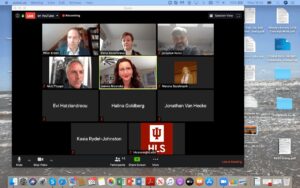 The panel discussed political developments in East-Central Europe in relation to the COVID-19 pandemic. In particular, while claiming to protect their citizens from the disease, the authorities in Poland, Hungary, and Belarus have made a series of controversial decisions, with potentially grave implications for these countries’ futures. The panelists also included Jarosław Kuisz, journalist for Kultura liberana in Poland; and Nick Thorpe, BBC correspondent for Hungary and the greater CEE region, moderated by Peter Kreko, journalist and expert on Hungarian politics. More information about the conference is available here and on the Indiana University website.
The panel discussed political developments in East-Central Europe in relation to the COVID-19 pandemic. In particular, while claiming to protect their citizens from the disease, the authorities in Poland, Hungary, and Belarus have made a series of controversial decisions, with potentially grave implications for these countries’ futures. The panelists also included Jarosław Kuisz, journalist for Kultura liberana in Poland; and Nick Thorpe, BBC correspondent for Hungary and the greater CEE region, moderated by Peter Kreko, journalist and expert on Hungarian politics. More information about the conference is available here and on the Indiana University website.
Expert meeting with Kishore Mahbubani, 28 April 2020
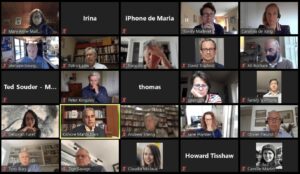 On 28 April COMPASS PDRA Dr. Irina Petrova joined a zoom expert meeting organised by The Monthly Barometer. The session titled ‘The pandemic and its impact on the China-US rivalry’ featured Kishore Mahbubani, a Distinguished Fellow at the Asia Research Institute, National University of Singapore, who presented his latest book ‘Has China won?’ published in March 2020. The discussion focused on the contemporary US-China relations, reflecting, in particular, on the impact of COVID-19 on the bilateral relations and international affairs more broadly, as well asprospects for the balance of power in future.
On 28 April COMPASS PDRA Dr. Irina Petrova joined a zoom expert meeting organised by The Monthly Barometer. The session titled ‘The pandemic and its impact on the China-US rivalry’ featured Kishore Mahbubani, a Distinguished Fellow at the Asia Research Institute, National University of Singapore, who presented his latest book ‘Has China won?’ published in March 2020. The discussion focused on the contemporary US-China relations, reflecting, in particular, on the impact of COVID-19 on the bilateral relations and international affairs more broadly, as well asprospects for the balance of power in future.
International Academic Conference, ‘The Great Patriotic War in the fate of the Belarusian nation’, BSU, Belarus, April 23, 2020
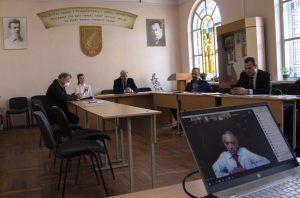 The role and importance of the Great Patriotic War (1941–1945) cannot be overestimated. The memory about those incredibly difficult times constitute an inevitable part of the historic consciousness of Belarusians. Considering all this and on the eve of the 75th anniversary of the Great Victory, the BSU Faculty of History in partnership with the Faculty of History of the Moscow Lomonosov State University, a number of NGOs, memory institutions and with the support of GCRF COMPASS project organised and held this international conference. Given the difficult pandemic situation, the conference went largely online. The plenary was addressed by BSU Rector Professor Andrei Karol, participants included Vice-Rector Ivan Yanushevich, Dean of the Faculty of History Professor Aliaksandr Kakhanouski, Head of Source Study Department Professor Siarhei Khodzin and other leading researchers and practitioners from Belarus, Russia and other countries. Belarus COMPASS NTL Artsiom Nazaranka presented on the current social perception of the Great Patriotic War – based on recent focus groups. The different views presented by the speakers were united by a mutual striving for careful, responsible and professional approach to history. Conference proceedings will be published later in 2020. The conference programme can be found here.
The role and importance of the Great Patriotic War (1941–1945) cannot be overestimated. The memory about those incredibly difficult times constitute an inevitable part of the historic consciousness of Belarusians. Considering all this and on the eve of the 75th anniversary of the Great Victory, the BSU Faculty of History in partnership with the Faculty of History of the Moscow Lomonosov State University, a number of NGOs, memory institutions and with the support of GCRF COMPASS project organised and held this international conference. Given the difficult pandemic situation, the conference went largely online. The plenary was addressed by BSU Rector Professor Andrei Karol, participants included Vice-Rector Ivan Yanushevich, Dean of the Faculty of History Professor Aliaksandr Kakhanouski, Head of Source Study Department Professor Siarhei Khodzin and other leading researchers and practitioners from Belarus, Russia and other countries. Belarus COMPASS NTL Artsiom Nazaranka presented on the current social perception of the Great Patriotic War – based on recent focus groups. The different views presented by the speakers were united by a mutual striving for careful, responsible and professional approach to history. Conference proceedings will be published later in 2020. The conference programme can be found here.
COMPASS Virtual Workshop, 23-24 April 2020
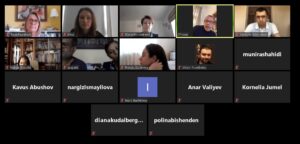 COMPASS virtual workshop titled ‘The making of resilient communities in Central Eurasia’ took place on 23-24 April 2020. It brought together GCRF COMPASS researchers and members of the Advisory Board to discuss resilience and adaptation strategies of the local communities in Central Eurasia. The programme can be accessed here. The follow-up workshop is scheduled for June 2020, more information will be available shortly.
COMPASS virtual workshop titled ‘The making of resilient communities in Central Eurasia’ took place on 23-24 April 2020. It brought together GCRF COMPASS researchers and members of the Advisory Board to discuss resilience and adaptation strategies of the local communities in Central Eurasia. The programme can be accessed here. The follow-up workshop is scheduled for June 2020, more information will be available shortly.
Expert meeting with HE President Armen Sarkissian, 13 April 2020
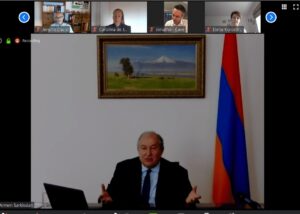 On 13 April 2020 Professor Korosteleva and Dr Petrova were invited to join a zoom expert meeting with HE President Armen Sarkissian, along with 25 other world experts to discuss the implications of the coronavirus on international politics and the region. President Sarkissian presented his understanding of change, from a quantum physics perspective (available here); and invited experts for Q&A. Professor Korosteleva had an opportunity to ask him about complexity as a new reality and the role of local communities in building resilience and managing complexity. The discussion lasted for over an hour which brief summary is available here (enclosed)
On 13 April 2020 Professor Korosteleva and Dr Petrova were invited to join a zoom expert meeting with HE President Armen Sarkissian, along with 25 other world experts to discuss the implications of the coronavirus on international politics and the region. President Sarkissian presented his understanding of change, from a quantum physics perspective (available here); and invited experts for Q&A. Professor Korosteleva had an opportunity to ask him about complexity as a new reality and the role of local communities in building resilience and managing complexity. The discussion lasted for over an hour which brief summary is available here (enclosed)
Online Forum ‘The Pandemic Disruptor: COVID-19’s implications for East European security’, 7 April 2020 12:00 – 13:15 Uk time
The forum was organised conjointly by Minsk Dialogue Council on International Relations (Belarus), Konrad-Adenauer-Stiftung (Germany), Eastern Europe Studies Centre (Lithuania), Centre for Eurasian and European Studies at the Faculty of International Relations, Belarusian State University (Belarus), and GCRF COMPASS Project (UK).
The forum discussed the implications of the COVID-19 pandemic for the security of wider Europe, and possible measures to mitigate them. Professor Korosteleva outlined five specific concerns that may have an impact on the current status quo, including 1) the return of the state; 2) the prospect of economic recession; 3) the return of borders and breakdown of European solidarity; 4) double-edge globalisation effect on developing countries in the region; and 5) the alleged ‘death of resilience’ requiring more central control. The programme is available, and the discussion could be viewed here, on the Minsk Dialogue’s You Tube Channel.
Guest lecture by Professor Jan Orbie, 2 April 2020
On 2 April 2020 the Director of the Centre for EU Studies at Ghent University, Professor Jan Orbie delivered a guest lecture “The EU as a development actor: A sort of critical prespective”. He discussed the ongoing debates in the field, problematising the notions of actorness and development and presenting an alternative postdevelopment agenda. The feasablity and potentail models of a revised EU development policy were discussed in the Q&A session.
COMPASS Zoom Cafe, 31 March 2020
On 31 March 2020, COMPASS launched its first zoom cafe for all consortium participants, to exchange reflections on the crisis and to discuss ways of how to maintain intellectual and social engagement by means of technology. As a result it has been decided to launch the Crisis Reflection portal and to contribute individual reflection pieces on personal experiences of the crisis and its different aspects.
Guest lecture by Matthieu Burnay, 19 March 2020
On 19 March 2020 Dr Matthieu Burnay, Senior Lecturer in Global Law at the Queen Mary University of London, presented his lecture “China, the European Union, and the Future of the Liberal International Order”. The talk touched upon the crisis of the liberal international order and the ways China is filling gaps in the existing order. The EU’s position on the emerging order and China’s role in it was analysed, providing a comprehensive picture of the EU-China cooperation and the possiblity of cooperative regional orders.
Roundtable and Navroz celebrations, 9 March 2020, Cambridge – cancelled
A roundtable with invited speakers titled ‘Progress and Development in Central Asia and the Caucasus’ will take place at the University of Cambridge on the 9th of March. It will be followed by the annual Navroz celebrations with performances from the Central Asian region.
Roundtable on Current Developments in Uzbekistan, 26 February 2020, Cambridge
On 26 February 2020 the GCRF COMPASS Cambridge team led by Dr Saxena organised a roundtable on current developments in Uzbekistan and its relations with the Eurasian Economic Union. The roundtable included insightful presentations by Mr Odilbek Isakov, Deputy Finance Minister of Uzbekistan and Sanjar Valiev, Deputy Director of the Institute of Strategic & Regional Studies, and panel discussions initiated by Prof. Korosteleva (Kent), Dr Raina (UKRI-GCRF Challenge Lead), Dr Petrova (Kent), Prof. Ray (Jesus College), Dr Fennell (Centre of Development), P. Kalra and Dr Kudaibergenova – the COMPASS members. The roundtable was followed by talks with Dr Neelam Raina and the COMPASS team about the strategic importance of Central Eurasia in the UKRI research and planning. Please see the programme here
ADA University Training School, 17-21 February 2020, Baku
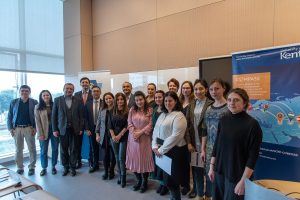 ADA University ran its first GCRF COMPASS international Training School for Early Career Researchers. It involved 16 participants from across the region, and the COMPASS consortium, presenting their research, participating in skills training sessions and discovering the country through organised tours to Atashgah and Yanardag. The skills workshops focused on how to publish an article in higher-impact journal and requirements for international publishing (by A. Valiyev, ADA);
ADA University ran its first GCRF COMPASS international Training School for Early Career Researchers. It involved 16 participants from across the region, and the COMPASS consortium, presenting their research, participating in skills training sessions and discovering the country through organised tours to Atashgah and Yanardag. The skills workshops focused on how to publish an article in higher-impact journal and requirements for international publishing (by A. Valiyev, ADA);
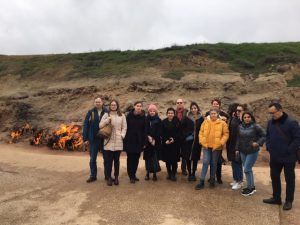 how to raise an international profile & biometrics (by G. Polglase, CCCU UK); how to write a book proposal (by E. Korosteleva, Kent UK); and how to apply for funding (by I. Petrova, Kent UK, and A. Nazaranka, BSU Belarus). The school was a great success, thanks to the enormous effort of the local COMPASS team, led by Nargiz Ismayilova, ADA University.
how to raise an international profile & biometrics (by G. Polglase, CCCU UK); how to write a book proposal (by E. Korosteleva, Kent UK); and how to apply for funding (by I. Petrova, Kent UK, and A. Nazaranka, BSU Belarus). The school was a great success, thanks to the enormous effort of the local COMPASS team, led by Nargiz Ismayilova, ADA University.
Leadership Winter Training School, 11 February 2020, Cambridge
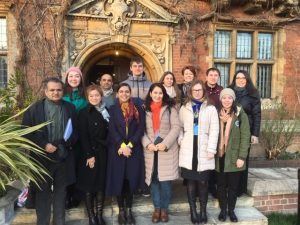
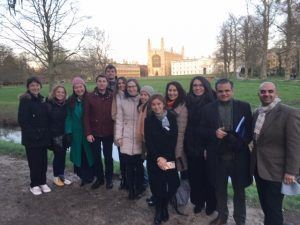 Professor Korosteleva and Dr Irina Petrova were invited to speak at the ‘Leadership Programme on Solving Global Challenges’, a GCRF COMPASS Winter Training School, organised by the Cambridge COMPASS team. Co-jointly with Dr Kudaibergenova, they discussed the challenges of defining Eurasia as a construct, and the Eurasian Economic Union as practical example of regional integration and its challenges. More information can be found here.
Professor Korosteleva and Dr Irina Petrova were invited to speak at the ‘Leadership Programme on Solving Global Challenges’, a GCRF COMPASS Winter Training School, organised by the Cambridge COMPASS team. Co-jointly with Dr Kudaibergenova, they discussed the challenges of defining Eurasia as a construct, and the Eurasian Economic Union as practical example of regional integration and its challenges. More information can be found here.
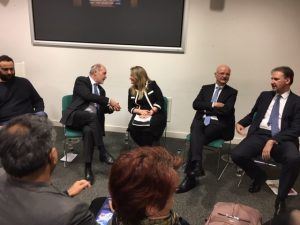 Thereafter the Winter School members also participated in a roundtable discussion of the Future of European Defence Policy involving Ambassadors of Greece, Austria and Croatia, and D. Patrikarakos, the author of War in 140 Characters, chaired by the Master of St Edmund’s College, Catherine Arnold OBE, Cambridge University.
Thereafter the Winter School members also participated in a roundtable discussion of the Future of European Defence Policy involving Ambassadors of Greece, Austria and Croatia, and D. Patrikarakos, the author of War in 140 Characters, chaired by the Master of St Edmund’s College, Catherine Arnold OBE, Cambridge University.
Guest Lecture by Ignacio Garcia Bercero, 30 January 2020, University of Kent
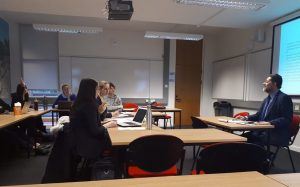 The COMPASS team at Kent and postgraduate students of the EU in the Global World, welcomed Mr Ignacio Garcia Bercero, Director General, DG Trade of the European Commission as their guest speaker. Mr Bercero, who is currently a fellow-in-residence at Oxford University, has shared his experience of negotiations with partners in the eastern Neighbourhood and Central Asia, and more recently – with the Eurasian Economic Union. The issues of geopolitics, and strategic priorities of the new Commission, especially towards the Central Eurasian region, were also discussed.
The COMPASS team at Kent and postgraduate students of the EU in the Global World, welcomed Mr Ignacio Garcia Bercero, Director General, DG Trade of the European Commission as their guest speaker. Mr Bercero, who is currently a fellow-in-residence at Oxford University, has shared his experience of negotiations with partners in the eastern Neighbourhood and Central Asia, and more recently – with the Eurasian Economic Union. The issues of geopolitics, and strategic priorities of the new Commission, especially towards the Central Eurasian region, were also discussed.
Pre-Launch UKRI/GCRF Conflict Intersections Funding Call Event, 28-29 January 2020, Bishkek
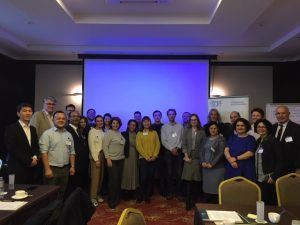 The COMPASS team represented by scholars from Kent, Cambridge, and regional partner-institutions – ADA University, BSU, TNU, UWED and ERI from Kazakhstan – were invited by the GCRF challenge leader, Dr Neeelam Raina, and her team, to participate in the pre-launch of the new GCRF Global Partnership Call, to develop new proposals on conflict intersections for Central Asia and wider Eurasian region. The workshop involved about 40 regional scholars, DFID, FCO and GCRF representatives, brainstorming on research issues relevant for the region and developing them into concrete proposals as part of the GCRF UKRI capacity-building initiative.
The COMPASS team represented by scholars from Kent, Cambridge, and regional partner-institutions – ADA University, BSU, TNU, UWED and ERI from Kazakhstan – were invited by the GCRF challenge leader, Dr Neeelam Raina, and her team, to participate in the pre-launch of the new GCRF Global Partnership Call, to develop new proposals on conflict intersections for Central Asia and wider Eurasian region. The workshop involved about 40 regional scholars, DFID, FCO and GCRF representatives, brainstorming on research issues relevant for the region and developing them into concrete proposals as part of the GCRF UKRI capacity-building initiative.
GROW Conference, 21 January 2020, University of Kent
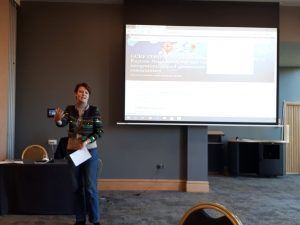
On 21 January, Prof. Korosteleva presented the COMPASS project findings to the GROW conference at Kent University. The conference hosted current grant holders and future applicants, as well as funders’ representatives to discuss opportunities for further growth.
COMPASS Workpackage Meeting, 18 – 19 January 2020, Almaty, Kazakhstan
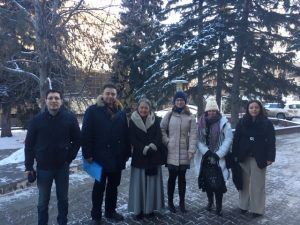
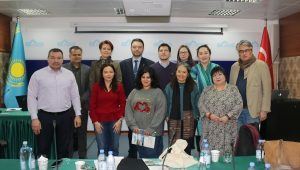
On 18-19 January, the GCRF COMPASS team gathered at the Eurasian Research Institute in Almaty to discuss findings of the focus groups and plan ahead with nation-wide surveys. The teams also discussed plans for the dissemination of results at international conferences and through joint publications, as well as in the form of policy recommendations to reveal emergent patterns of resilience, identity and self-governance. Special thanks go to Dr Diana Kudaibergenova for leading WP4, and to the local supporters – Dr Albina Muratbekova (ERI) and Dr Chokan Laumulin (CCAF Cambridge).
Roundtable on Parliamentary Discussion, 5 December 2019, Jesus College Cambridge
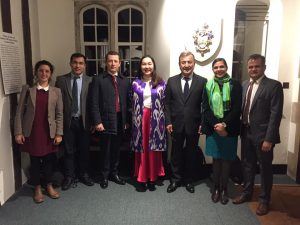 GCRF COMPASS Cambridge in collaboration with Centre of Development Studies and Cambridge Central Asia Forum hosted Senator Safoev and HE Rustamov, Republic of Uzbekistan for a Roundtable on Parliamentary Discussion in Jesus College, University of Cambridge. Prof Parker (Head of Cavendish Labs), Prof Nolan, Dr Lane, Dr Chang (Director, Centre of Dev Studies) and Prof Korosteleva (PI, Uni of Kent) attended the event. Dr Saxena Chaired the Roundtable.
GCRF COMPASS Cambridge in collaboration with Centre of Development Studies and Cambridge Central Asia Forum hosted Senator Safoev and HE Rustamov, Republic of Uzbekistan for a Roundtable on Parliamentary Discussion in Jesus College, University of Cambridge. Prof Parker (Head of Cavendish Labs), Prof Nolan, Dr Lane, Dr Chang (Director, Centre of Dev Studies) and Prof Korosteleva (PI, Uni of Kent) attended the event. Dr Saxena Chaired the Roundtable.
Keynote Lecture ‘Resilience: another buzzword or an opportunity for more adaptable (EU) governance?’ 3 December 2019, European Studies Centre, St. Antony’s College Oxford
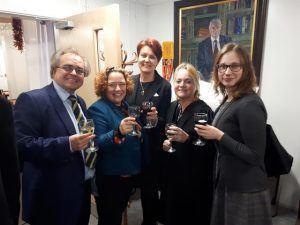 Professor Korosteleva gave a keynote lecture titled ‘Resilience: another buzzword or an opportunity for more adaptable (EU) governance?’, at the European Studies Centre, St Antony’s College, Oxford University. Her keynote was chaired by Professor Kalypso Nicolaidis, with Dr Heidi Maurer as discussant – to both of whom Elena records her enormous gratitude. Her talk attracted over 40 students, scholars and practitioners, including from the IMF, EU trade and humanitarian policies divisions. Elena focused on unpacking the term ‘resilience’ to give it a more unifying meaning as ‘self-governance’, and its application by the EU. The talk was premised on her contribution to the Special Issue: Korosteleva, E. and Flockhart, T. (eds) ‘The EU and Resilience: redefining the role of “the local” and “the person” in a new global governance agenda’, Contemporary Security Policy (in press), 28 February 2020. More information here.
Professor Korosteleva gave a keynote lecture titled ‘Resilience: another buzzword or an opportunity for more adaptable (EU) governance?’, at the European Studies Centre, St Antony’s College, Oxford University. Her keynote was chaired by Professor Kalypso Nicolaidis, with Dr Heidi Maurer as discussant – to both of whom Elena records her enormous gratitude. Her talk attracted over 40 students, scholars and practitioners, including from the IMF, EU trade and humanitarian policies divisions. Elena focused on unpacking the term ‘resilience’ to give it a more unifying meaning as ‘self-governance’, and its application by the EU. The talk was premised on her contribution to the Special Issue: Korosteleva, E. and Flockhart, T. (eds) ‘The EU and Resilience: redefining the role of “the local” and “the person” in a new global governance agenda’, Contemporary Security Policy (in press), 28 February 2020. More information here.
International symposium ‘ Turning ‘brain drain’ into ‘brain circulation’ 25 – 27 November 2019, Dushanbe, Tajikistan
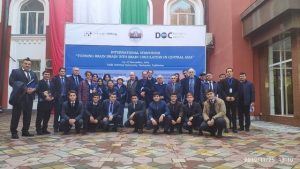 Tajik National University is hosting an international symposium ’Turning “brain drain” into ‘brain circulation” in Central Asia’. The symposium is jointly organised by the Faculty of International Relations TNU and Dialogue of Civilisations (DOC) Research Institute, a COMPASS partner, with the support of VW Foundation. Main speakers included DOC senior researchers, regional scholars and Dr Jan-Peter Olters, World Bank Country Manager for Tajikistan. The conference attracted a large number of speakers, and will be followed by published proceedings.
Tajik National University is hosting an international symposium ’Turning “brain drain” into ‘brain circulation” in Central Asia’. The symposium is jointly organised by the Faculty of International Relations TNU and Dialogue of Civilisations (DOC) Research Institute, a COMPASS partner, with the support of VW Foundation. Main speakers included DOC senior researchers, regional scholars and Dr Jan-Peter Olters, World Bank Country Manager for Tajikistan. The conference attracted a large number of speakers, and will be followed by published proceedings.
First EBRD Eastern Partnership Investment Summit, 22 November 2019, London
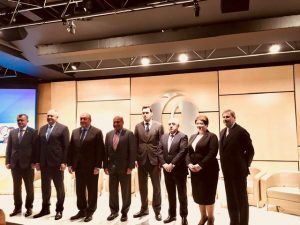 Professor Korosteleva was invited to attend the first EBRD Eastern Partnership Investment Summit organised in London to mark the 10-year anniversary of the Eastern Partnership Initiative in the neighbourhood, and discuss further cooperation and investment in the region. The participants were welcomed by Sir Suma Chakrabarti, EBRD President, and EU Commissioner Johannes Hahn, followed by a plenary panel of Heads of State and Prime Ministers from the region presenting their visions for future development. Notably, the panel included the President of Armenia HE Armen Sarkissian; Prime Minister of Azerbaijan HE Ali Asadov; Prime Minister of Belarus HE Sergei Roumas; Prime Minister of Moldova HE Ion Chicu; Prime Minister of Ukraine HE Oleksiy Honcharuk, and Deputy Prime Minister of Georgia HE Maya Tskitishvili, and was moderated by the EBRD chief economist – Beata Javorcik. The focus was on continuing reforms against corruption to ensure political and economic stability, and citizens’ greater involvement in the governance of the region.
Professor Korosteleva was invited to attend the first EBRD Eastern Partnership Investment Summit organised in London to mark the 10-year anniversary of the Eastern Partnership Initiative in the neighbourhood, and discuss further cooperation and investment in the region. The participants were welcomed by Sir Suma Chakrabarti, EBRD President, and EU Commissioner Johannes Hahn, followed by a plenary panel of Heads of State and Prime Ministers from the region presenting their visions for future development. Notably, the panel included the President of Armenia HE Armen Sarkissian; Prime Minister of Azerbaijan HE Ali Asadov; Prime Minister of Belarus HE Sergei Roumas; Prime Minister of Moldova HE Ion Chicu; Prime Minister of Ukraine HE Oleksiy Honcharuk, and Deputy Prime Minister of Georgia HE Maya Tskitishvili, and was moderated by the EBRD chief economist – Beata Javorcik. The focus was on continuing reforms against corruption to ensure political and economic stability, and citizens’ greater involvement in the governance of the region.
Meeting with AIG Senior Partners, 18 November 2019, London
Following the AIG/Chatham House event in October in Vienna where Professor Korosteleva presented the COMPASS project and its research, she was subsequently invited by the AIG senior partners to a meeting in London to discuss prospects for developing synergies between the AIG and the COMPASS project over the Central Eurasian region. The region is generating a lot of attention owing to its unique position and under-studied potential, as well as the EU and China’s interest and ongoing investment in the region.
SEnECA Final Conference ‘What Future for EU-Central Asia Relations?’, 14 – 15 November 2019, Brussels, Belgium
On 14-15 November 2019, Irina Petrova (Kent) represented the GCRF COMPASS team at the final conference of the H2020 Consortium ‘Strengthening and Energizing EU Central Asia Relations’ (SEnECA). Beside SEnECA members and external researchers, the conference featured H. E. Peter Burian, EU Special Representative for Central Asia, EEAS; H. E. Romana Vlahutin, Ambassador at large for connectivity, EEAS; Angela Atzori, International Aid &Cooperation Officer–Cultural Sector, DG DEVCO, as well as H.E. Dr Erkinkhon Rahmatullozoda, Ambassador of Tajikistan to the Kingdom of Belgium and H. E. Aigul Kuspan, Ambassador of Kazakhstan to Belgium. SEnECA policy recommendations for strengthening the EU-Central Asia relations were discussed over two days with a particular focus on connectivity, culture and communication. The programme of the conference can be found here.
Institutional Change and Social Practice. Research on Political Systems, Economy and Society in Central Asia and the Caucasus, 12 – 14 November, Frankfurt, Germany
Professor Korosteleva was invited to participate at the conference titled ‘Institutional Change and Social Practice. Research on Political Systems, Economy and Society in Central Asia and the Caucasus’, and be part of the evaluation panel organised by the Volkswagen Foundation, in Frankfurt. The conference attracted scholars from the Bielefeld, TU Dortmund, Giessen and Halle-Wittenberg Universities in Germany, PRIO in Norway, Vienna, Ghent and Cambridge Universities, and involved early career researchers from the region, presenting their post-doctoral projects for the VW fellowships. Professor Korosteleva discussed opportunities for developing cooperation under the GCRF project with the VW staff.
International Signature Conference: Uzbekistan in the Context of Regional Security and Global Change, 7 – 8 November 2019, Tashkent, Uzbekistan
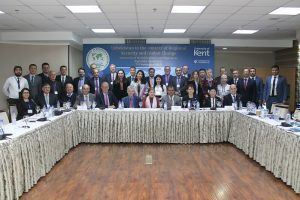 Under the aegis of the GCRF COMPASS project, UWED organised its first international signature conference titled ‘Uzbekistan in the context of Regional Security and Global Change’. The conference gathered over 40 international and regional participants, including scholars from the UK (Kent, Cambridge, St Andrews, Oxford, and Newcastle Universities), COMPASS partner-institutions (ADA University, BSU, TNU and UWED), EU, US, China, Afghanistan, and Russia. It also attracted interest from the Uzbek government, UK and EU Embassies, the House of Lords (UK) and many local independent researchers and think-tanks. The conference focused on the ongoing reforms in the country, Uzbekistan’s role in the region, as well as its relations with the UK, European Union, Russia, US and China.
Under the aegis of the GCRF COMPASS project, UWED organised its first international signature conference titled ‘Uzbekistan in the context of Regional Security and Global Change’. The conference gathered over 40 international and regional participants, including scholars from the UK (Kent, Cambridge, St Andrews, Oxford, and Newcastle Universities), COMPASS partner-institutions (ADA University, BSU, TNU and UWED), EU, US, China, Afghanistan, and Russia. It also attracted interest from the Uzbek government, UK and EU Embassies, the House of Lords (UK) and many local independent researchers and think-tanks. The conference focused on the ongoing reforms in the country, Uzbekistan’s role in the region, as well as its relations with the UK, European Union, Russia, US and China.
Final programme. Conference website. Conference proceedings
Open Lectures at UWED, 5 November 2019, Tashkent, Uzbekistan
Senior Members of the COMPASS Consortium gave open lectures to the UWED students: Professor Victor Shadurski, Dean of the Faculty of International Relations, Belarusian State University, spoke about the success and challenges for the Eurasian Economic Union, and Professor Elena Korosteleva, Principal Investigator of the GCRF COMPASS project and Director of the Global Europe Centre, discussed the challenges of the EU Global Security Strategy and the shift to resilience-thinking [please see here].
Eastern Partnership (EaP) Reflection Forum, 21 – 23 October 2019, Chisinau,Moldova
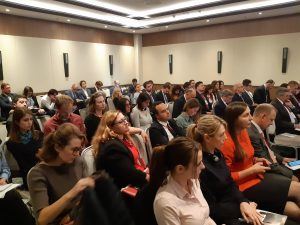 GCRF COMPASS Postdoctoral Associate Irina Petrova attended the EaP Reflection Forum ‘The Eastern Partnership in the next ten years – What Strategy for the European Union’s Eastern neighbourhood?’. Organised by the Institute for European Policies and Reforms (IPRE) in cooperation with a number of European think tanks, the Forum aimed to facilitate the dialogue among policy-making, expert and academic communities of the EU and EaP states. The Forum reflected on the progress of the Eastern Partnership policy and outlined policy recommendations for the EU and Moldova. Further information about the event is available here.
GCRF COMPASS Postdoctoral Associate Irina Petrova attended the EaP Reflection Forum ‘The Eastern Partnership in the next ten years – What Strategy for the European Union’s Eastern neighbourhood?’. Organised by the Institute for European Policies and Reforms (IPRE) in cooperation with a number of European think tanks, the Forum aimed to facilitate the dialogue among policy-making, expert and academic communities of the EU and EaP states. The Forum reflected on the progress of the Eastern Partnership policy and outlined policy recommendations for the EU and Moldova. Further information about the event is available here.
Roundtable on OSCE & Europe’s Strategy in Central Asia and the Caucasus, 18 October 2019, University of Cambridge
GCRF COMPASS Cambridge at Centre of Development Studies, University of Cambridge and Cambridge Central Asia Forum, Jesus College organised a policy oriented roundtable discussion on OSCE and Europe’s strategy of engagement with Central Asia, Afghanistan, the Caucasus and Eurasia to mark Slovakia’s Chairmanship of the OSCE this year. This event is organised in partnership with H.E. Mr. Ľubomír Rehák, Ambassador Extraordinary and Plenipotentiary of the Slovak Republic. Mr Marek Varga, Head of Politico–Military Dimension and Conflicts Unit, Department of Political and Security Affairs, Directorate General for the Slovak OSCE Chairmanship. Ambassadors of Uzbekistan, Tajikistan and other Central Asian countries, along with First Consul of Embassy of Azerbaijan and Armenia in the UK attended the event. The draft programme is available here.
20th Annual Conference of the Central Eurasian Studies Society, 10 – 13 October 2019, Washington D.C.
 Dr Ulugbek Khasanov and Dr Akram Umarov (both UWED) and Dr Nargis Nurulla-Khodzaeva (TNU) represented the GCRF COMPASS project at the 20th annual CESS conference organised by the Central Asia Program of the George Washington University’s Institute for European, Russian and Eurasian Studies. The event brought together leading scholars and researchers from different disciplines united by their interest in Central Asia’s past, present and future.
Dr Ulugbek Khasanov and Dr Akram Umarov (both UWED) and Dr Nargis Nurulla-Khodzaeva (TNU) represented the GCRF COMPASS project at the 20th annual CESS conference organised by the Central Asia Program of the George Washington University’s Institute for European, Russian and Eurasian Studies. The event brought together leading scholars and researchers from different disciplines united by their interest in Central Asia’s past, present and future.
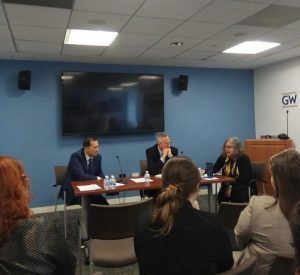 Through panel discussions, roundtable talks, debates, and academic presentations, the participants explored pressing topics of Central Asia in anthropology, cultural studies, art history, fine art, economics, education, energy and environment, gender studies, history, language and linguistics, law, literature, media, migration, political science and international relations, regional studies, religion and sociology. Dr Khasanov presented his paper coauthored with Dr Mason Jacobs from Michigan State University on “Fergana “riots” (1989)” within the special panel devoted to the book in progress on the topic of “Collapse and re-birth: a living archive on the end of the USSR and afterward”. Dr Umarov chaired the panel on “Regional cooperation: local framework and broader context” with papers of researchers from Land Berlin (Germany), Seoul National University (Republic of Korea), Princeton University (the USA) and Nankai University (China).
Through panel discussions, roundtable talks, debates, and academic presentations, the participants explored pressing topics of Central Asia in anthropology, cultural studies, art history, fine art, economics, education, energy and environment, gender studies, history, language and linguistics, law, literature, media, migration, political science and international relations, regional studies, religion and sociology. Dr Khasanov presented his paper coauthored with Dr Mason Jacobs from Michigan State University on “Fergana “riots” (1989)” within the special panel devoted to the book in progress on the topic of “Collapse and re-birth: a living archive on the end of the USSR and afterward”. Dr Umarov chaired the panel on “Regional cooperation: local framework and broader context” with papers of researchers from Land Berlin (Germany), Seoul National University (Republic of Korea), Princeton University (the USA) and Nankai University (China).
 Dr Khasanov chaired the panel “Challenges and opportunities of finding regionalism in Eurasia”. This panel discussed papers by Dr Nurulla-Khodzaeva, Dr Umarov and Dr Ruben Elamiryan (Russian-Armenian University). Dr Umarov presented his paper on the impact of Donald Trump’s policy on the process of the BRI’s implementation in Central Asia. He argued that the new character of the American foreign policy under the leadership of Donald Trump has also had an impact on Central Asia. Even though the US president practically did not mention the region in his election campaign, his recent decisions might have had a direct impact on the development of events in Central Asia. The resulting “vacuum of influence” in the APR might lead to an even greater presence of China in the region and a decrease in attention to the development of the BRI project, in which Central Asia could play one of the definitive roles.
Dr Khasanov chaired the panel “Challenges and opportunities of finding regionalism in Eurasia”. This panel discussed papers by Dr Nurulla-Khodzaeva, Dr Umarov and Dr Ruben Elamiryan (Russian-Armenian University). Dr Umarov presented his paper on the impact of Donald Trump’s policy on the process of the BRI’s implementation in Central Asia. He argued that the new character of the American foreign policy under the leadership of Donald Trump has also had an impact on Central Asia. Even though the US president practically did not mention the region in his election campaign, his recent decisions might have had a direct impact on the development of events in Central Asia. The resulting “vacuum of influence” in the APR might lead to an even greater presence of China in the region and a decrease in attention to the development of the BRI project, in which Central Asia could play one of the definitive roles.
This trip would be impossible without support of the GCRF COMPASS project.
Belt & Road 2.0 AIG Multinational Conference 2019, 10 October 2019, Vienna, Austria
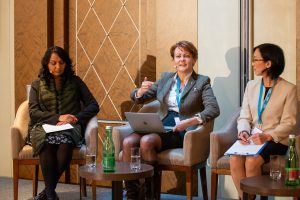
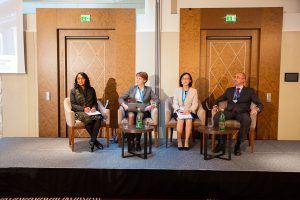 Professor Korosteleva was invited to speak at the ‘Belt & Road 2.0’ AIG multinational conference 2019 in Vienna on 10 October 2019. The conference was organised in partnership with Chatham House and Roland Berger, having attracted over 100 attendees and speakers from the AIG, Baker McKenzie, Asian Development Bank, Deutsche Bank, ICBC Standard Bank China, UK Investment Office UBS Wealth Managements and more. The focus was on the relaunch of the BRI 2.0 and its challenges, including the ‘people-to-people’ dimension, discussed at the final panel of the conference. Professor Korosteleva offered her insights on this important topic, with reference to the COMPASS project’s findings and conceptual thinking about ‘resilience’ and local ownership. The panel speakers also included Chinara Esengul, Head of Central Asia Programme, Peace Nexus Foundation, and Bernardo Mariani, Head of China Programme, Saferworld, moderated by Dr Champa Patel, Head of Asia-Pacific Programme, Chatham House, London.
Professor Korosteleva was invited to speak at the ‘Belt & Road 2.0’ AIG multinational conference 2019 in Vienna on 10 October 2019. The conference was organised in partnership with Chatham House and Roland Berger, having attracted over 100 attendees and speakers from the AIG, Baker McKenzie, Asian Development Bank, Deutsche Bank, ICBC Standard Bank China, UK Investment Office UBS Wealth Managements and more. The focus was on the relaunch of the BRI 2.0 and its challenges, including the ‘people-to-people’ dimension, discussed at the final panel of the conference. Professor Korosteleva offered her insights on this important topic, with reference to the COMPASS project’s findings and conceptual thinking about ‘resilience’ and local ownership. The panel speakers also included Chinara Esengul, Head of Central Asia Programme, Peace Nexus Foundation, and Bernardo Mariani, Head of China Programme, Saferworld, moderated by Dr Champa Patel, Head of Asia-Pacific Programme, Chatham House, London.
Minsk Dialogue Policy Forum: European Security: Stepping back from the Brink, 7 – 9 October 2019, Minsk, Belarus
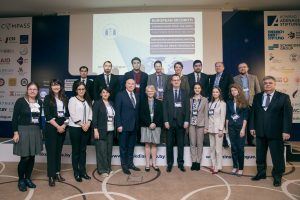
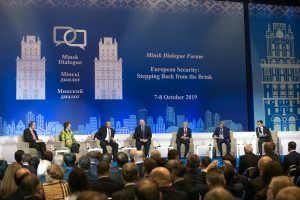
7 – 8 October 2019 saw the 2nd year of the Minsk Dialogue Policy Forum, which was organised in partnership with the COMPASS project. It attracted over 700 academics, policy-makers and practitioners from 61 countries. This year it focused on “European Security: Stepping back from the Brink”, covering relations with major powers, the role of international organisations, regional conflicts development across Central Eurasia, and relations between competing initiatives from the EU, EAEU and BRI. COMPASS hosted two plenaries, including with Lord Teverson’s participation, one special panel on Central Asia, and concluding reception on Day 2 of the forum. Day 2 of the forum included a presidential plenary, with President Lukashenko, Baroness Ashton, and Mr Vershbov among others. The new feature of the forum was the Future Leaders Session, which brought together 16 young participants from the COMPASS consortium (Kent, Cambridge, BSU, ADA University, TNU and UWED) and European Leadership Network. They presented a joint Declaration at the opening of the Forum, describing major challenges for the regional security and their possible solutions. The session received feedback from the UK, EU and Russian Ambassadors – Their Excellences Jaqueline Perkins, Dirk Schuebel, and Dmitry Mezentsev – and Valery Varanetsky, MP Belarus. The Declaration will be included in the MD forum policy paper, to be disseminated to all major UK, EU and national stakeholders of the forum. A more detailed account can be found here and on these websites:
Minsk Dialogue Forum 2019 Day 1
Minsk Dialogue Forum 2019 Day 2
International Conference: Cultural Diplomacy in Central Asia and Eurasia. 16 – 17 September 2019, Dushanbe, Tajikistan
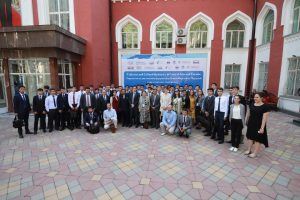 On 16-17 September 2019 the Tajik National University (TNU) held its first landmark event as part of the COMPASS project – a two-day international conference with a focus on Tajikistan and the role of cultural diplomacy in the regional revival. With reference to the Tajik National Development Strategy 2030, discussion addressed the issues of local vulnerabilities, including environment and trade/economic concerns, resilience-building and the role of cultural heritage for sustainable development. Apart from the TNU staff, NGO and government representatives, participants also included international scholars from the Universities of Kent, Cambridge and Oxford (UK); ADA University (Azerbaijan), BSU (Belarus), and UWED (Uzbekistan). The conference also hosted a keynote speech on the EU New Strategy to Central Asia from the EU Special Envoy, Ambassador Burian, and HE Marilyn Josefson, Head of EU Delegation to Tajikistan; intervention by Peter Fernandes Cardy, Head of regional DFID, and a plenary session with HM Ambassador Matthew Lawson and Lord Sheikh (UK), which attracted over 70-wide audience, half of which were students from local universities. We record special thanks to the local organisers of the conference – TNU national lead Professor Munira Shahidi, and her team, including the volunteers from the charity organisation ‘Peshraft’ led by Matlyuba Salikhova, as well as COMPASS postdoc assistants – Diana T. Kudaibergenova, Irina Petrova and Eske van Gils. Final programme
On 16-17 September 2019 the Tajik National University (TNU) held its first landmark event as part of the COMPASS project – a two-day international conference with a focus on Tajikistan and the role of cultural diplomacy in the regional revival. With reference to the Tajik National Development Strategy 2030, discussion addressed the issues of local vulnerabilities, including environment and trade/economic concerns, resilience-building and the role of cultural heritage for sustainable development. Apart from the TNU staff, NGO and government representatives, participants also included international scholars from the Universities of Kent, Cambridge and Oxford (UK); ADA University (Azerbaijan), BSU (Belarus), and UWED (Uzbekistan). The conference also hosted a keynote speech on the EU New Strategy to Central Asia from the EU Special Envoy, Ambassador Burian, and HE Marilyn Josefson, Head of EU Delegation to Tajikistan; intervention by Peter Fernandes Cardy, Head of regional DFID, and a plenary session with HM Ambassador Matthew Lawson and Lord Sheikh (UK), which attracted over 70-wide audience, half of which were students from local universities. We record special thanks to the local organisers of the conference – TNU national lead Professor Munira Shahidi, and her team, including the volunteers from the charity organisation ‘Peshraft’ led by Matlyuba Salikhova, as well as COMPASS postdoc assistants – Diana T. Kudaibergenova, Irina Petrova and Eske van Gils. Final programme
